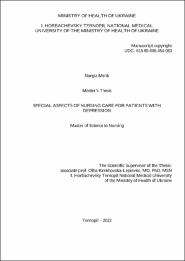SPECIAL ASPECTS OF NURSING CARE FOR PATIENTS WITH DEPRESSION
Abstract
he relevance of depression is chiefly determined by its increasing prevalence. In recent decades, depression is no longer a merely psychiatric problem. There are more and more discussions and publications on depression in patients with somatic disease. Depression is a type of affective disorder (mood disorder). However, it differs from conventional mood swings or short-term emotional responses to difficult situations in everyday life. Depression may be a serious disease, especially if it recurs and is moderate or severe. In such cases, depression leads to more suffering, reduced working capacity/academic performance and problems in patient’s family life. In the most severe cases, depression may lead to suicide. Depression is not only about suicidal thoughts and actions; this condition substantially deteriorates the quality of life of the patients. Early diagnosis may improve treatment outcomes and will allow the patients to feel better and to have more strength for implementation of their plans. Involvement of nursing personnel in diagnosis, treatment and care will be a significant factor in improving the current situation. Based on global experience in treatment of patients with depression, to provide scientific rationale for the principles guiding the organization of nursing process in this disease, as well as the goals and the structure of this process. The methods of study: epidemiological, statistical and clinical methods (observation, comparison and measurement). The results of the research study deepen the knowledge of the etiological factors and pathogenesis of depression, its diagnostic criteria and principles of treatment. In course of the study, the investigator has defined the main objectives, structure and methods of nursing process in patients with depression. The study has determined the typical problems of patients with depression and evaluated their quality of life.

